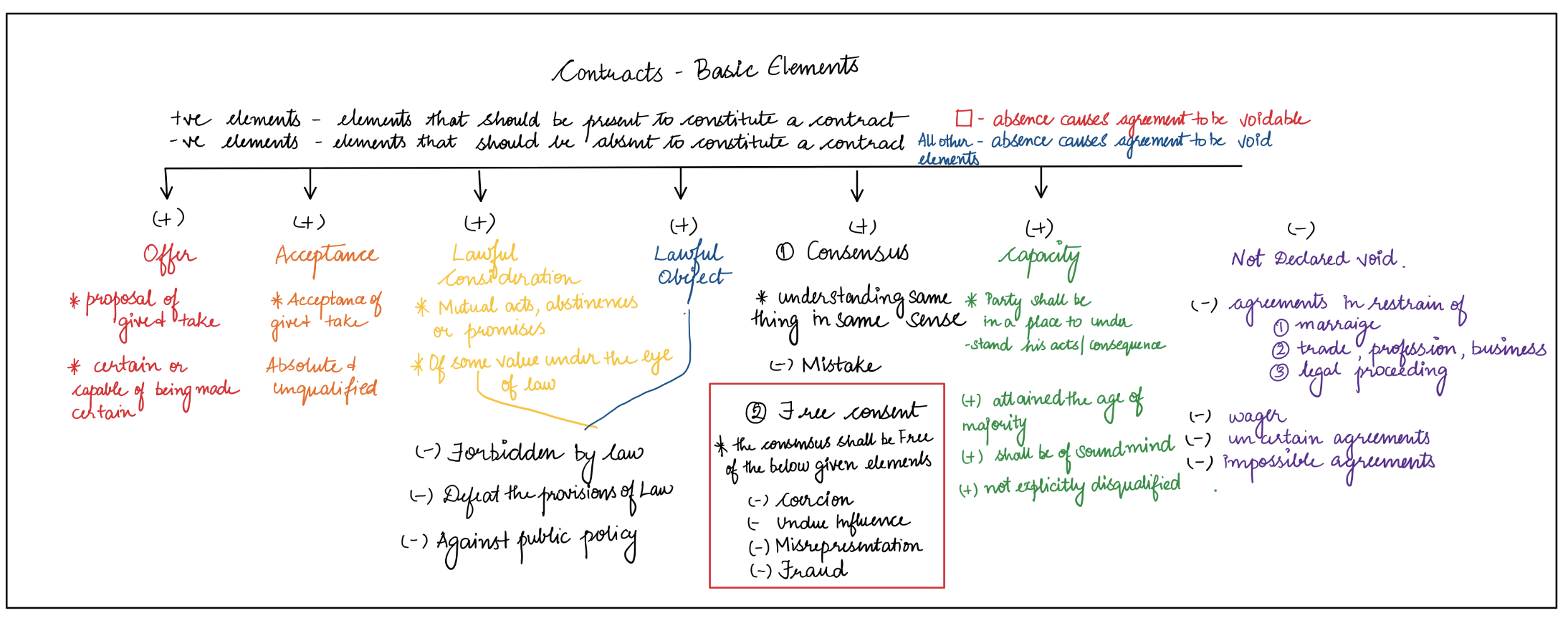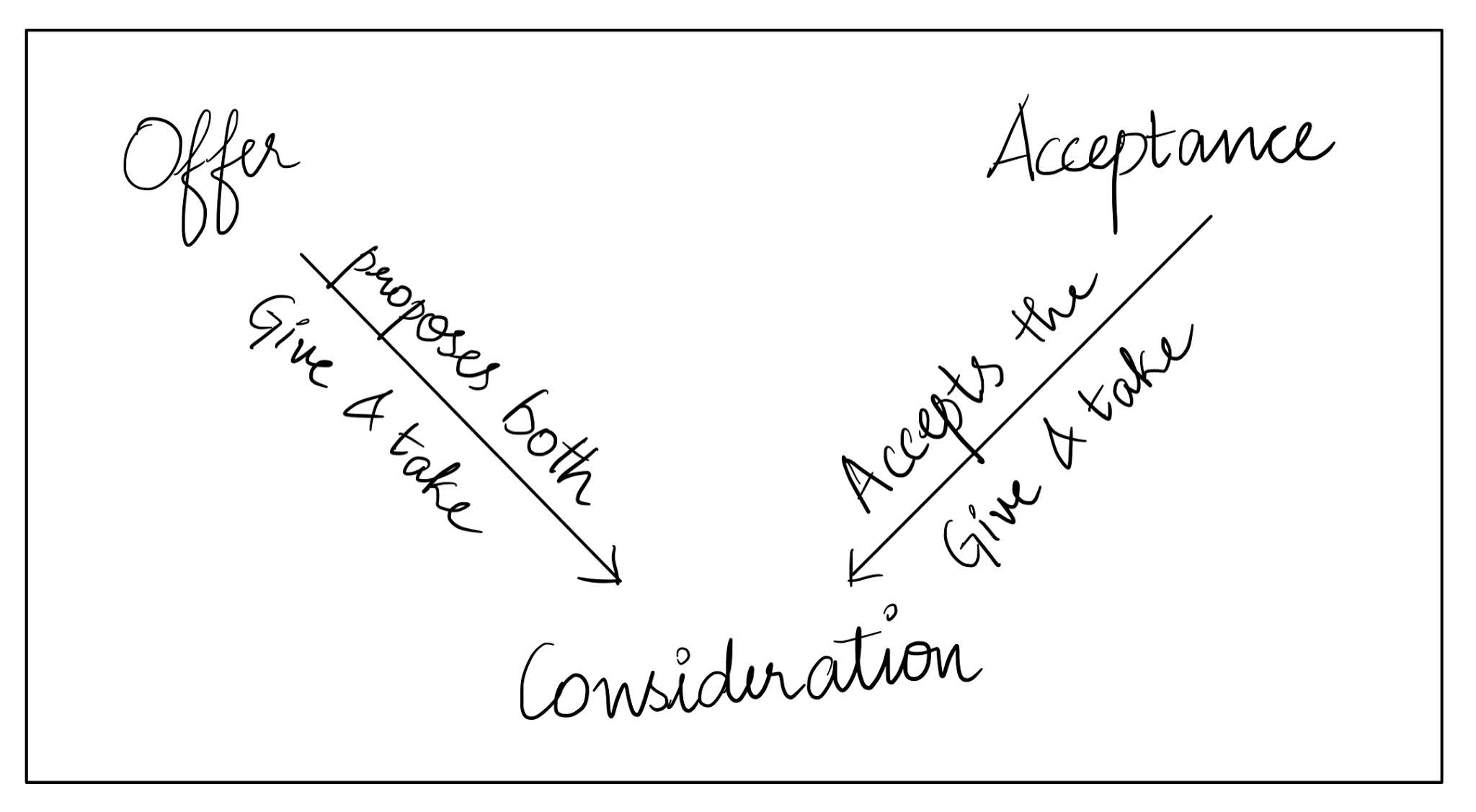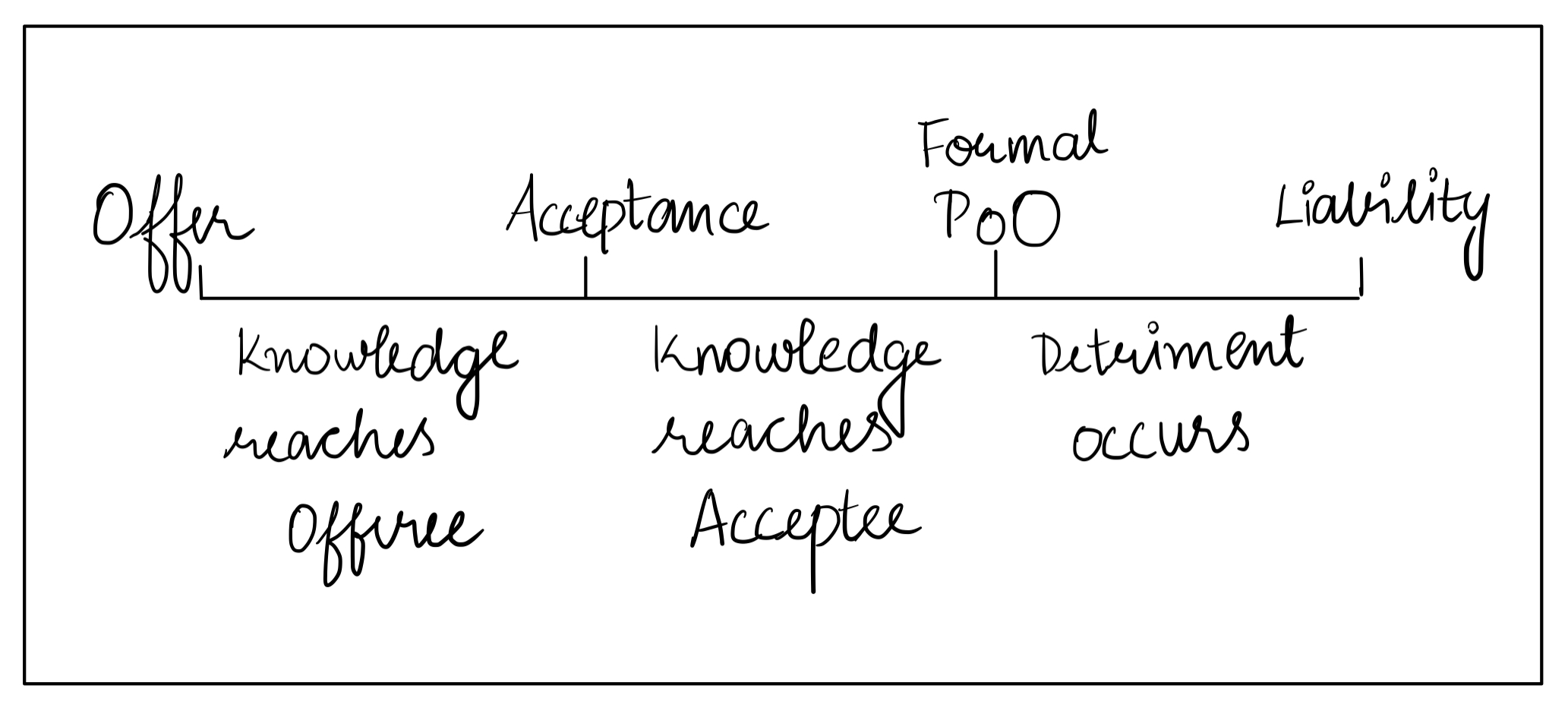MODULE 1
This article intends to give an general overview of the law of Contracts. This overview shall give us a basic working knowledge of contracts and help us in gain nuanced understanding of the field.
OVERVIEW

This mind map covers the entire elements that makes a contract valid under the purview of Indian Contract Act. This serves the purpose of giving the reader a purview of the course that’s going to be covered and we would be coming back to this mind map after the entire course is covered for a revision to help us aid an understand of the course. Statements that are denoted with the star (*) in front of it are simple one line definitions whereas statements with plus or minus symbol before it denote positive and negative sub elements that ought to be present and absent respectively to constitute the primary elements.
Primary Formula
AGREEMENT = OFFER + ACCEPTANCE + CONSIDERATION
Elements – explained
- Offer – Act of proposing a transaction (a give and take) with the willingness to be bound by it immediately, if accepted.
- Acceptance – Act of accepting the proposed transaction in an absolute and unqualified or complete manner without any change.
- Consideration – Subject of the transaction or what was essentially exchanged through the transaction.
- Agreement – Mutual acts, abstinences or promises.
Therefore, in an Agreement, an offer usually proposes two promises (give and take) which is absolutely and unconditionally accepted through an acceptance. In this transaction, the promises to act or the act itself constitutes the consideration. One who promises is called the ‘promisor’ and the one to whom the promise is made is the ‘promisee’.
Note -
A Promise is different from an Offer/Proposal. A promise is a future undertaking to do or not to do an act that is binding on the person who made it. The difference between an ‘Offer’ and a ‘Promise’ being that unlike the former the latter is always one sided.
A promises B to give him a chocolate. In this promise A has one sidedly taken a binding obligation to provide B with a chocolate. Herein B is not bound to buy the same. Whereas If A offers B to give him a chocolate for Rs.5, then here A has proposed two promises (a chocolate for Rs 5) which becomes a mutually binding obligation if B accepts the same absolutely and unconditionally.

Reasonable Person Standards
Intentions and Objectives behind doing a same act may differ from person to person. What a person might find reasonable and just could be unreasonable and unjust to another. Therefore it’s a principle of equity to decide Justice from a reasonable person’s perspective. This Reasonable Person Standards differ from case to case. Therefore Law assumes a meaning of and intentions behind an act from a reasonable man’s perspective irrespective of what the subjective intention or meaning behind the act was while doing the act.
OFFER
An act signifying a person’s willingness to do(+ve act) or refrain(-ve act) from doing an act with the intention of earning another person’s assent to such act or abstinence in exchange for something from the assenting person.
The main element that qualifies a statement as an offer is the statement maker’s intention to be bound by the statement as soon as its accepted. Offers can also be called ‘proposals’.
From the perspective of offer, the person who offers is the ‘offerer’ and the person to whom the offer is made is the ‘offeree’.
ACCEPTANCE
The act of assenting to an offer is called an Acceptance. But an acceptance must be absolutely in accordance with the offer. That is to say any deviation from the exact terms of the offer in the statement of acceptance, shall disqualify such a statement as acceptance. This is based on essential understanding that agreement is two parties agreeing on exactly the same thing. This understanding is codified as the principle ‘consensus ad idem’, which require the parties to the agreement to agree to exchange same things in the same sense (sec13).
From the perspective of acceptance, the person who accepts is the ‘acceptor’ and the person to whom the acceptance is made is the ‘acceptee’.
CONSIDERATION
Any consideration shall be in the form of Acts, abstinences, or promises.
Therefore any acts, abstinences, or promises at the desire of the promisor that was offered and accepted by the parties to form the subject matter of the transaction are the considerations in an agreement.
Consideration in all most all the agreements shall be mutual(with certain exceptions). Offers usually in itself specifies the considerations in a transaction (both give and take) which is accepted.
Consideration helps us to quantify the value of the transaction. Therefore it should be of some value under the eyes of law. That is to say, consideration need not be adequate, but only quantifiable and legal.
For eg, an entire house could be legally sold for a rupee even though it’s not in accordance with the market or basic value for a house. All that matters is that both the considerations, that is the act of selling the house and the transferring the money is quantifiable and legal.
In some agreements it might be difficult to exactly identify the consideration. Therefore, the thumb rule for identifying Consideration in an agreement is as a detriment(reduction in value) to the giver. Some particular examples of legal considerations recognised by precedence are -
- Forbearance (as a form of abstinence) of the right to litigate irrespective of it being vexatious or an unwinnable claim.
- Forbearance of choice - Choosing a particular way of doing an act out of various ways. For example, out of various ways to drive to a place one party asking the driver to take a particular route (even a longer route than the others, if needed) forbearing his choice to take other routes is a good consideration.
- Performance of an existing duty which not enforceable under law - time barred debt.
- Practical benefit - immediate performance in place of breach and subsequent enforcement through court.
Types of consideration
- Present (executed) consideration – considerations that ARE simultaneously done with along with the agreement. Acts and abstinence are present considerations. Eg – an act of buying a chocolate in exchange of ₹5, where the store owner has a present reduction in the value of chocolate and the buyer has a reduction in value to the extent of ₹5.
- Future (executory) consideration – future considerations made in form of promises to do or not to do acts in future. Eg – an rental agreement, where both the parties promise to provide shelter in exchange of money and vice versa for agreed future period.
- Past considerations – past considerations are previous acts that are independent acts done even before the agreement was thought of. The general rule is that past acts can’t be considerations because of the fact that there was no intention to form an agreement when the act was done. But the law has created an exception where a past act or abstinence can be a consideration if it was done at the request of one of the parties to the other party in the agreement.
POINT OF ORIGINATION OF AN AGREEMENT
Chapter I of ICA handles the Point of Origination. There are two Points of Origination (PoO) to an agreement, for the purposes of understanding.
PoO means the point from which both the parties are now bound to act as per the terms of the agreement. The formal PoO is when the knowledge of the acceptance by the offeree reaches the offerer from the former officially.
If dwelled further, different parties are bound by their promises at different steps of the agreement. To elaborate, under S.5 of ICA the offerer is allowed to modify or withdraw his/her offer till the exact point where acceptance made by the offeree is sent or communicated to the offerer so as to be out of his/her control to modify or revoke. Thus under S.4 offer is complete and offerer is bound by the offer from the moment the acceptance is posted or made to the offerer by the offeree.
Similarly, under S.5 the acceptor shall modify or withdraw his/her acceptance till the point when the knowledge of the acceptance officially reaches the acceptee. Following which under S.4 acceptance is complete and acceptor(offeree) is bound by his/her acceptance from the point when the knowledge about the acceptance officially reaches the acceptee(offerer). The term ‘officially’ is used to exclude the possibility of such knowledge of the acceptance reaching the offerer from sources other than the acceptor.
Communication of the offer and acceptance can be in instantaneous (when both the parties are together or in a call etc) and non-instantaneous forms (when the parties communicate through letter, fax etc). The above rules applies in all these circumstances.
The jurisdiction of the agreement as a general rule always lies at the place where the contract was concluded that’s is PoO of the agreement. Therefore the jurisdiction falls in the place where the knowledge of the acceptance officially reaches the acceptee(offerer).
The actual liability occurs only when there is an actual detriment from either parties. That is to say, until this point neither party can claim compensation in case of breach by the other, because there is no actual loss occurred. This is followed from the principle of promissory estoppel, which says a promisor can’t back out of a promise he/she made cost free, if the promisee has taken action based on the promise that could cause a loss to him/her if breached. The promisee in this case gains the right to be compensated if the promisor backs out.
